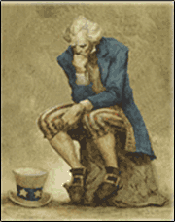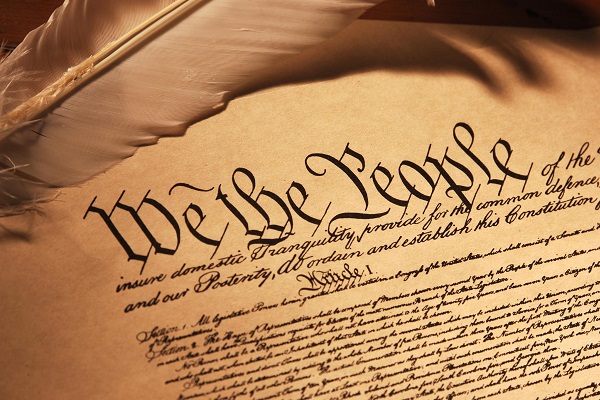
–>
February 2, 2023
Over at Power Line, Professor Steven Hayward recently asked, “Are We Trapped in a Locke-Box?” It is an important question because most books on the American founders make the claim that the British philosopher John Locke provides the key to the founders’ thinking. But does he?
‘); googletag.cmd.push(function () { googletag.display(‘div-gpt-ad-1609268089992-0’); }); }
I had used the same image, the image of a Locke-box, in an article of mine. I had written that there is a steady stream of books and articles trying to stuff the founders into a Locke-box, but that into the Locke-box the Founders cannot be made to go. I wrote that the founders were declaring that they were not followers of Locke every time they declared that you and I have unalienable rights. In fact, they were proclaiming that they were un-Lockeans, that it was Locke specifically they had left behind.
This is simple to demonstrate. All we need to do is look up the word “alienable” in a dictionary. It is a word with an unusually precise definition, unchanged from the founders’ day until our own. Here is how it is defined in my dictionary: “adj. Law. Capable of being transferred to the ownership of another” (emphasis mine). That is the complete definition in my dictionary.
Property rights are alienable rights. If I sell you or give you my car, then you become the rightful owner of that car.
‘); googletag.cmd.push(function () { googletag.display(‘div-gpt-ad-1609270365559-0’); }); }
This simple definition is devastating to the Locke-boxers. Locke had famously declared that our right to life and our right to liberty are our property. Lo In the Declaration of Independence and everywhere in their writings and speeches, the founders declared that our right to life and our right to liberty are unalienable rights. To declare that those rights are unalienable is to declare that they are not property.
The term “unalienable rights” occupies a commanding position in the vocabulary of the founders. It is missing from Locke’s vocabulary. There is nothing mysterious about that; the founders were not Lockeans.
The founders made their revolution in political thinking with the aid of a philosopher of the Scottish Enlightenment named Francis Hutcheson. Hutcheson: “Our rights are either alienable or unalienable … our right to our goods and labours is naturally alienable.” Hutcheson and his followers in the philosophical school of common sense shaped the idea of America fundamentally, causing America to be known as the common sense nation.
Because most books on the founders claim that the founders are Lockeans, you and I have a problem: when we set out to understand the founders, we are almost certain to get misinformed along the way. What are we to do?
Here is my suggestion: to avoid getting trapped in the Locke-box, we need to examine the index of any book on the founders. The best new book on the founders is a great example of what checking the index can do for us. Andrew Browning’s brilliant Schools for Statesmen: The Divergent Educations of the Constitution’s Framers has 44 Hutcheson entries. Here is one from early in the book: “The modern philosopher most widely assigned to college students [in the founders’ time] was Francis Hutcheson.”
Instead of asserting that the Framers were Lockeans and trying to make everything they wrote and said fit into that preconception, Browning carefully examined what the individuals at the Constitutional Convention actually thought and how their different educations formed their thinking.
‘); googletag.cmd.push(function () { googletag.display(‘div-gpt-ad-1609268078422-0’); }); } if (publir_show_ads) { document.write(“
Books that make the case for the importance of Hutcheson and the other thinkers of the Scottish Enlightenment to the American founding, books like my brief book Common Sense Nation and Browning’s extraordinarily in-depth Schools For Statesmen, are rare. Books that limit their discussions to what can be found within the confines of the Locke-box are the norm.
There are many books of the Locke-box variety, but we need to select one in order to find out what can happen when an author tries to explain the founders while keeping within the confines of the Locke-box. In his article about the Locke-box, Professor Hayward provides us with an excellent suggestion when he promises a rejoinder in defense of Locke-box thinking from Thomas West. “I’ll have some rejoinders from Tom West in due course[.]”
West’s The Political Theory of the American Founding is an excellent example for our purpose. If we turn to its index, we will find there are no Hutcheson entries. Consequently, it is unsurprising that West finds problems with unalienable rights. For West, the founders’ idea of unalienable rights is fundamentally inconsistent: our rights are “from one point of view partly alienable and from another wholly inalienable.” (West prefers “inalienable” to “unalienable.”) But, of course, our rights are not alienable from one point of view and unalienable from another point of view. Our alienable rights and our unalienable rights are rights of different kinds. Your right to your car is an alienable right; you can sell it or give it away. Your right to life and your right to liberty are unalienable rights; you cannot transfer them to the ownership of another.
And so it goes for the other thinkers of the Scottish Enlightenment. For example, it was from Thomas Reid that the founders got their understanding of self-evident truths. Browning has 18 entries for Thomas Reid; West has none. Self-evident truth fares no better in West’s book. According to West, what the Declaration of Independence calls a self-evident truth is actually “an unsupported assertion of something strongly believed.” This claim and West’s claim about rights alienable and unalienable are a far cry from the actual political theory of the American founding.
If you want to understand the American founders, it is best to check the index of any book on the founders that catches your interest. Otherwise, you might end up in the Locke-box like so many others.
Robert Curry is the author of Common Sense Nation: Unlocking the Forgotten Power of the American Idea and Reclaiming Common Sense: Finding Truth in a Post-Truth World. Both are published by Encounter Books.

Image via Pixy.
<!– if(page_width_onload <= 479) { document.write("
“); googletag.cmd.push(function() { googletag.display(‘div-gpt-ad-1345489840937-4’); }); } –> If you experience technical problems, please write to [email protected]
FOLLOW US ON
<!–
–>
<!– _qoptions={ qacct:”p-9bKF-NgTuSFM6″ }; ![]() –> <!—-> <!– var addthis_share = { email_template: “new_template” } –>
–> <!—-> <!– var addthis_share = { email_template: “new_template” } –>






